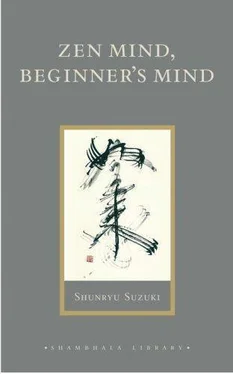My teacher had a callous on his forehead from bowing. He knew he was an obstinate, stubborn fellow, and so he bowed and bowed and bowed. The reason he bowed was that inside himself he always heard his master’s scolding voice. He had joined the Soto order when he was thirty, which for a Japanese priest is rather late. When we are young we are less stubborn, and it is easier to get rid of our selfishness. So his master always called my teacher “You-lately-joined-fellow,” and scolded him for joining so late. Actually his master loved him for his stubborn character. When my teacher was seventy, he said, “When I was young I was like a tiger, but now I am like a cat!” He was very pleased to be like a cat.
Bowing helps to eliminate our self-centered ideas. This is not so easy. It is difficult to get rid of these ideas, and bowing is a very valuable practice. The result is not the point; it is the effort to improve ourselves that is valuable. There is no end to this practice.
Each bow expresses one of the four Buddhist vows. These vows are: “Although sentient beings are innumerable, we vow to save them. Although our evil desires are limitless, we vow to be rid of them. Although the teaching is limitless, we vow to learn it all. Although Buddhism is unattainable, we vow to attain it.” If it is unattainable, how can we attain it? But we should! That is Buddhism.
To think, “Because it is possible we will do it,’’ is not Buddhism. Even though it is impossible, we have to do it because our true nature wants us to. But actually, whether or not it is possible is not the point. If it is our inmost desire to get rid of our self-centered ideas, we have to do it. When we make this effort, our inmost desire is appeased and Nirvana is there. Before you determine to do it, you have difficulty, but once you start to do it, you have none. Your effort appeases your inmost desire. There is no other way to attain calmness. Calmness of mind does not mean you should stop your activity. Real calmness should be found in activity itself. We say, “It is easy to have calmness in inactivity, it is hard to have calmness in activity, but calmness in activity is true calmness.”
After you have practiced for a while, you will realize that it is not possible to make rapid, extraordinary progress. Even though you try very hard, the progress you make is always little by little. It is not like going out in a shower in which you know when you get wet. In a fog, you do not know you are getting wet, but as you keep walking you get wet little by little. If your mind has ideas of progress, you may say, “Oh, this pace is terrible!” But actually it is not. When you get wet in a fog it is very difficult to dry yourself. So there is no need to worry about progress. It is like studying a foreign language; you cannot do it all of a sudden, but by repeating it over and over you will master it. This is the Soto way of practice. We can say either that we make progress little by little, or that we do not even expect to make progress. Just to be sincere and make our full effort in each moment is enough. There is no Nirvana outside our practice.
I do not feel like speaking after zazen. I feel the practice of zazen is enough. But if I must say something I think I would like to talk about how wonderful it is to practice zazen. Our purpose is just to keep this practice forever. This practice started from beginningless time, and it will continue into an endless future. Strictly speaking, for a human being there is no other practice than this practice. There is no other way of life than this way of life. Zen practice is the direct expression of our true nature.
Of course, whatever we do is the expression of our true nature, but without this practice it is difficult to realize. It is our human nature to be active and the nature of every existence. As long as we are alive, we are always doing something. But as long as you think, “I am doing this,” or “I have to do this,” or “I must attain something special,” you are actually not doing anything. When you give up, when you no longer want something, or when you do not try to do anything special, then you do something. When there is no gaining idea in what you do, then you do something. In zazen what you are doing is not for the sake of anything. You may feel as if you are doing something special, but actually it is only the expression of your true nature; it is the activity which appeases your inmost desire. But as long as you think you are practicing zazen for the sake of something, that is not true practice.
If you continue this simple practice every day you will obtain a wonderful power. Before you attain it, it is something wonderful, but after you obtain it, it is nothing special. It is just you yourself, nothing special. As a Chinese poem says, “I went and I returned. It was nothing special. Rozan famous for its misty mountains; Sekko for its water.” People think it must be wonderful to see the famous range of mountains covered by mists, and the water said to cover all the earth. But if you go there you will just see water and mountains. Nothing special.
It is a kind of mystery that for people who have no experience of enlightenment, enlightenment is something wonderful. But if they attain it, it is nothing. But yet it is not nothing. Do you understand? For a mother with children, having children is nothing special. That is zazen. So, if you continue this practice, more and more you will acquire something- nothing special, but nevertheless something. You may say “universal nature” or “Buddhanature” or “enlightenment.” You may call it by many names, but for the person who has it, it is nothing, and it is something.
When we express our true nature, we are human beings. When we do not, we do not know what we are. We are not an animal, because we walk on two legs. We are something different from an animal, but what are we? We may be a ghost; we do not know what to call ourselves. Such a creature does not actually exist. It is a delusion. We are not a human being anymore, but we do exist. When Zen is not Zen, nothing exists. Intellectually my talk makes no sense, but if you have experienced true practice, you will understand what I mean. If something exists, it has its own true nature, its Buddha nature. In the Pari — nirvana Sutra, Buddha says, “Everything has Buddha nature,” but Dogen reads it in this way: “Everything is Buddha nature.” There is a difference. If you say, “Everything has Buddha nature,” it means Buddha nature is in each existence, so Buddha nature and each existence are different. But when you say, “Everything is Buddha nature,” it means everything is Buddha nature itself. When there is no Buddha nature, there is nothing at all. Something apart from Buddha nature is just a delusion. It may exist in your mind, but such things actually do not exist.
So to be a human being is to be a Buddha. Buddha nature is just another name for human nature, our true human nature. Thus even though you do not do anything, you are actually doing something. You are expressing yourself. You are expressing your true nature. Your eyes will express; your voice will express; your demeanor will express. The most important thing is to express your true nature in the simplest, most adequate way and to appreciate it in the smallest existence.
While you are continuing this practice, week after week, year after year, your experience will become deeper and deeper, and your experience will cover everything you do in your everyday life. The most important thing is to forget all gaining ideas, all dualistic ideas. In other words, just practice zazen in a certain posture. Do not think about anything. Just remain on your cushion without expecting anything. Then eventually you will resume your own true nature. That is to say, your own true nature resumes itself.
Читать дальше


![Джон Харгрейв - Mind Hacking [How to Change Your Mind for Good in 21 Days]](/books/404192/dzhon-hargrejv-mind-hacking-how-to-change-your-min-thumb.webp)








